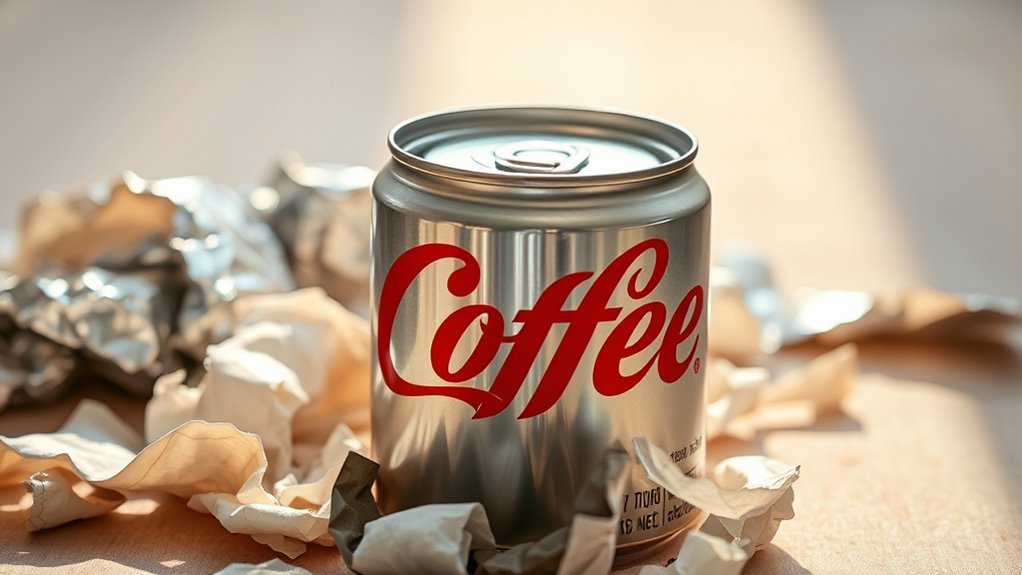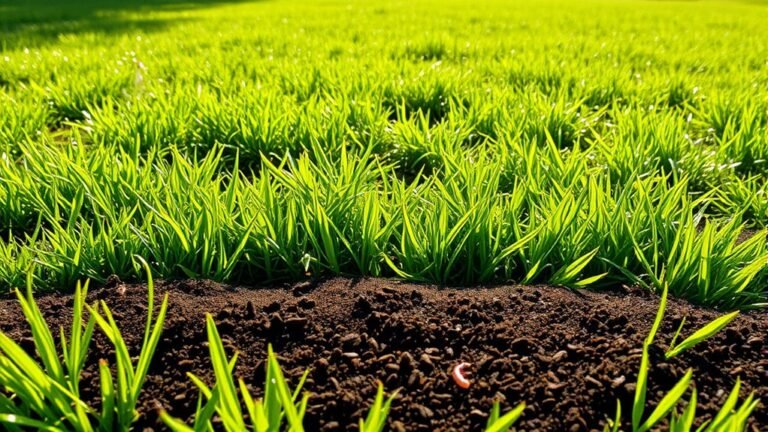Are Coffee Cans Recyclable
Yes, coffee cans are recyclable! They’re typically made from steel or aluminum, both of which are great for recycling. To guarantee your cans are recycled effectively, rinse them out to remove any coffee residue, remove lids, and dry them completely. Flattening the cans also saves space in your recycling bin. Make sure to check your local recycling guidelines for specifics. If you’re curious about other coffee-related items and their recyclability, there’s more to discover!
Understanding Coffee Can Materials
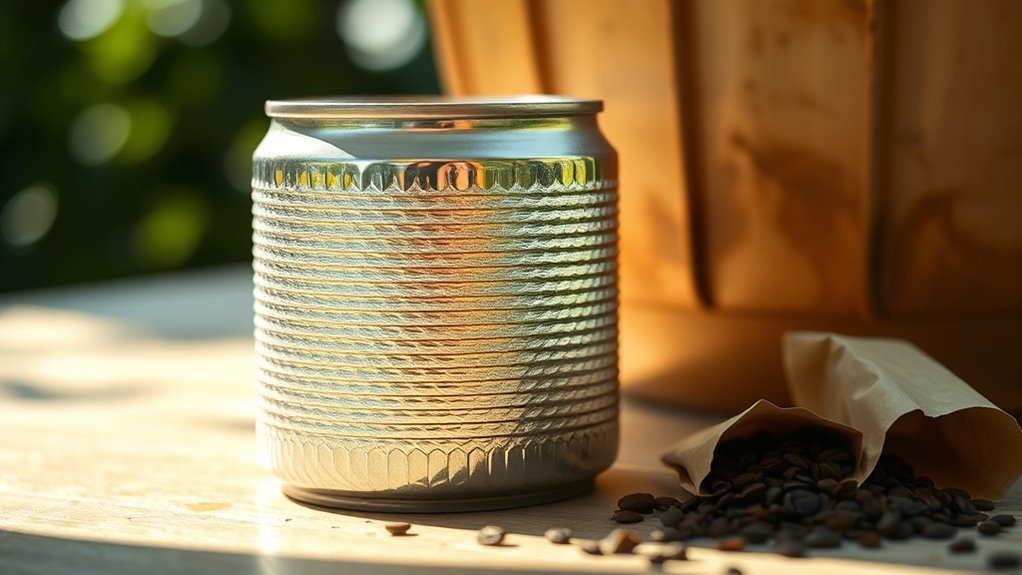
When it comes to understanding coffee can materials, you might be surprised by the variety that exists. Most coffee cans are made from metal compositions, primarily steel or aluminum. These materials aren’t just chosen for durability; they also help preserve the freshness of the coffee inside. Steel cans are often coated to prevent rust, while aluminum cans are lightweight and recyclable, making them an eco-friendly option. Each type of metal composition has its own advantages, impacting not only the product’s shelf life but also its environmental footprint. By understanding these materials, you can make more informed choices about your coffee consumption and its impact on the planet. It’s all about embracing freedom in your decisions, one cup at a time!
The Recycling Process for Metal Cans
When you recycle metal cans, the journey starts with collection and sorting, where your cans get separated from other materials. Next, they undergo cleaning and processing to guarantee they’re ready for their second life. Finally, these cleaned metals are re-manufactured into new products, showcasing the incredible cycle of recycling.
Collection and Sorting
Every year, millions of metal cans, including coffee cans, are collected for recycling, making the process of collection and sorting vital for effective waste management. You might be surprised to learn that there are various collection methods, such as curbside pickup and drop-off centers, tailored to maximize participation. Once collected, sorting technologies come into play, using advanced systems like conveyor belts and magnets to separate metal cans from other recyclables. This guarantees that the materials are pure, which is important for high-quality recycling. By understanding how collection and sorting work, you’re empowered to make informed decisions about your recycling habits, contributing to a more sustainable future. Your choices matter, and every can recycled helps reduce waste and conserve resources.
Cleaning and Processing
After metal cans, including coffee cans, are collected and sorted, the next significant step in the recycling process is cleaning and processing. This phase is essential for ensuring that your cans are ready for recycling. Various cleaning techniques, such as high-pressure washing and chemical treatments, remove residue and contaminants. Once cleaned, the cans are shredded into small pieces, making them easier to process. Different processing methods, like melting and refining, transform these shreds into high-quality raw materials. This not only conserves resources but also reduces energy consumption. By understanding and supporting these processes, you help close the loop in recycling, promoting a sustainable future. So, the next time you toss a coffee can, remember its journey doesn’t end there!
Re-manufacturing New Products
While many people may not realize it, the recycling process for metal cans, including coffee cans, plays an essential role in re-manufacturing new products. By utilizing advanced re-manufacturing techniques, recycled metals can be transformed into sustainable materials for various applications. Here’s how it works:
- Melting down the recycled metal
- Removing impurities for quality assurance
- Shaping into new products, like automotive parts
- Creating packaging materials for food and beverages
- Contributing to energy-efficient production methods
This process not only conserves energy but also reduces waste in landfills. By choosing to recycle coffee cans, you’re actively participating in a circular economy, helping to create a more sustainable future while enjoying the freedom of choice in your consumption habits.
What Makes Coffee Cans Different?
Though many people might not realize it, coffee cans possess unique characteristics that set them apart from other packaging materials. For starters, coffee can designs often prioritize functionality, featuring airtight seals that keep your coffee fresh and flavorful. This design is vital for preserving quality, which isn’t always found in other packaging options. In addition, coffee can sizes vary widely, accommodating everything from single servings to bulk purchases. This versatility makes them appealing to various consumers, whether you’re a casual drinker or a coffee enthusiast. Furthermore, the materials used in coffee cans can impact recyclability, making it essential to understand their specific traits. Recognizing these differences empowers you to make informed choices about sustainability and recycling.
How to Prepare Coffee Cans for Recycling
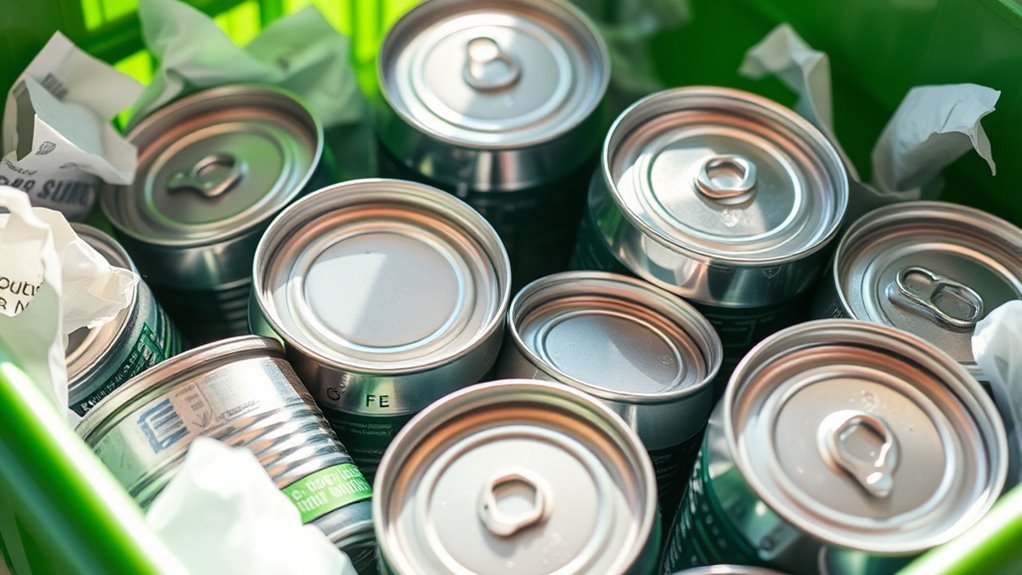
Before tossing your coffee cans into the recycling bin, it’s important to prepare them properly to guarantee they are accepted at your local recycling facility. Effective coffee can preparation can make a real difference in recycling efforts. Here are some recycling tips to keep in mind:
- Rinse the cans thoroughly to remove any leftover coffee residue.
- Remove the plastic or metal lids, as they may need to be recycled separately.
- Dry the cans completely to prevent contamination in the recycling stream.
- Flatten the cans to save space in your recycling bin.
- Check for any specific local guidelines regarding coffee cans.
Local Recycling Guidelines for Coffee Cans
When it comes to recycling coffee cans, knowing your local guidelines is essential for ensuring they’re processed correctly. Each community has specific rules regarding local recycling, so it’s crucial to familiarize yourself with them.
Here’s a quick reference table to help you navigate the guidelines:
| Recycling Status | Instructions |
|---|---|
| Accepted | Rinse and flatten cans |
| Not Accepted | Cans with plastic liners |
| Check Local | Visit your city’s website |
| Special Drop-off | Certain centers may accept |
Alternative Uses for Coffee Cans
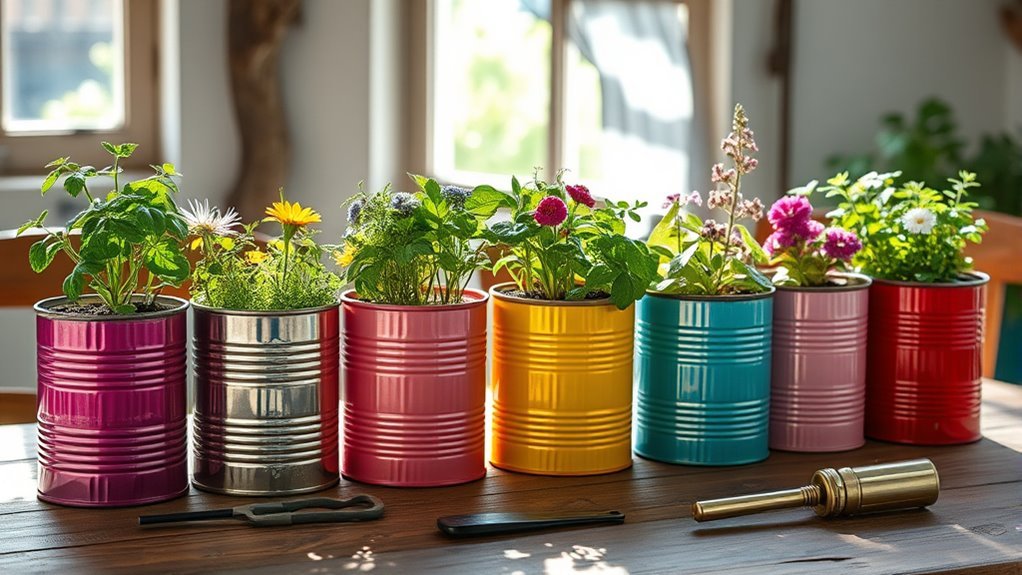
Coffee cans can be surprisingly versatile beyond their original purpose of holding your favorite brew. You can transform them into creative solutions around your home and garden. Here are some alternative uses to contemplate:
- Garden planters: Drill holes in the bottom for drainage, fill with soil, and grow herbs or flowers.
- Storage containers: Use them to organize craft supplies, tools, or office items.
- DIY lanterns: Punch holes in the sides, add a candle, and create a charming outdoor light.
- Bird feeders: Attach a perch and fill with birdseed to attract feathered friends.
- Gift packaging: Decorate a can and fill it with treats for a unique present.
Embrace these ideas, and give those cans a second life!
Environmental Impact of Proper Disposal
Finding new uses for coffee cans is just one way to reduce waste, but it’s equally important to contemplate the environmental impact of how we dispose of them. Proper disposal can enhance environmental awareness and promote sustainable practices, ensuring that materials are recycled effectively rather than ending up in landfills.
| Disposal Method | Environmental Impact | Sustainable Practices |
|---|---|---|
| Recycling | Reduces landfill waste | Conserves resources |
| Composting | Decomposes naturally | Enriches soil |
| Landfilling | Increases pollution | Wastes valuable materials |
Common Misconceptions About Recycling
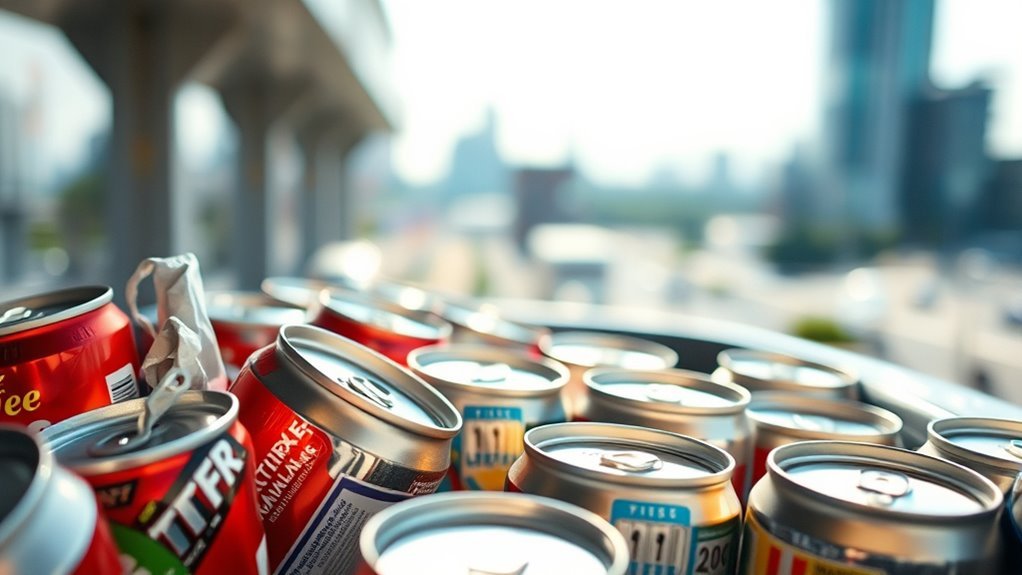
Have you ever wondered what really happens to your recyclables? You might be surprised by some common misconceptions surrounding recycling. Myth debunking is essential for effective recycling education. Here are a few myths you should know about:
- All recyclables are processed, regardless of contamination.
- Recycling always saves energy compared to making new products.
- You can toss everything in the recycling bin without sorting.
- Recycling is a complete solution to waste management.
- Plastic bags are recyclable in curbside bins.
Understanding these myths helps you make informed choices and encourages responsible recycling practices. By recognizing the truth, you can contribute to a cleaner environment and empower yourself with the knowledge necessary for effective recycling.
Other Coffee-Related Items and Their Recyclability
When it comes to coffee, many people don’t realize that various items associated with their daily brew have unique recycling guidelines. Understanding what you can recycle can empower you to make eco-friendly choices. Here’s a quick guide to help you navigate the recyclability of common coffee-related items:
| Item | Recyclable? | Notes |
|---|---|---|
| Coffee Filters | No | Often contaminated with oils |
| Espresso Pods | Depends | Check local guidelines |
| Coffee Grounds | Yes | Great for composting |
| Coffee Cans | Yes | Rinse before recycling |
Frequently Asked Questions
Can I Recycle Coffee Cans With Plastic Lids?
You can’t always recycle coffee cans with plastic lids easily. While the metal can itself is typically recyclable, the plastic lid often isn’t accepted in curbside recycling due to different materials. It’s important to check your local guidelines for plastic lid recycling, as rules vary. If you can, separate the lid from the can, and make sure the can is clean. This way, you’ve got a better chance of giving those materials a new life!
Are Rusted Coffee Cans Still Recyclable?
You might wonder if rusted coffee cans can still be recycled. The truth is, rusted metal can complicate recycling processes, but it doesn’t necessarily mean the cans are trash. Many recycling facilities can handle them, as they’ll strip away the rust during processing. However, if the rust is extensive, it might lower the value of the recycled material. Always check local guidelines to verify you’re making the best choice for recycling those cans!
What if the Can Is Stained With Coffee Residue?
If your coffee can’s stained with coffee residue, don’t worry too much. It’s often recyclable, but rinsing it out first can help. For effective recycling, follow these tips: scrape out any residue and give it a quick rinse to reduce contamination. Check local guidelines, as rules can vary. By doing this, you’re ensuring that your can has a better chance of being processed properly, contributing to a greener planet—freedom for our environment!
Can Coffee Cans Be Recycled Curbside?
Imagine your coffee can transforming into a vibrant flower pot, breathing new life into your garden. When it comes to curbside recycling, not all coffee can materials make the cut. If your can’s clean and dry, toss it in with your recyclables. But if it’s stained, it might end up in the landfill instead. Always check your local guidelines to verify your coffee cans can join the recycling revolution!
Are There Restrictions on Coffee Can Sizes for Recycling?
When it comes to recycling, you might wonder if there are restrictions on coffee can sizes. Generally, recycling guidelines vary by location, but most programs accept standard-sized coffee cans. However, oversized or uniquely shaped cans might not be accepted. To guarantee you’re recycling correctly, check your local guidelines. Staying informed helps you make a positive impact while enjoying your coffee, so you can freely contribute to a greener planet.
